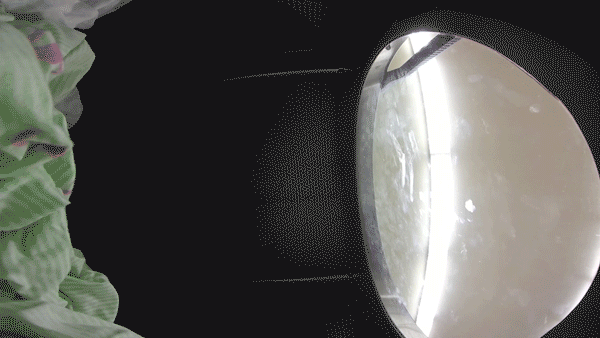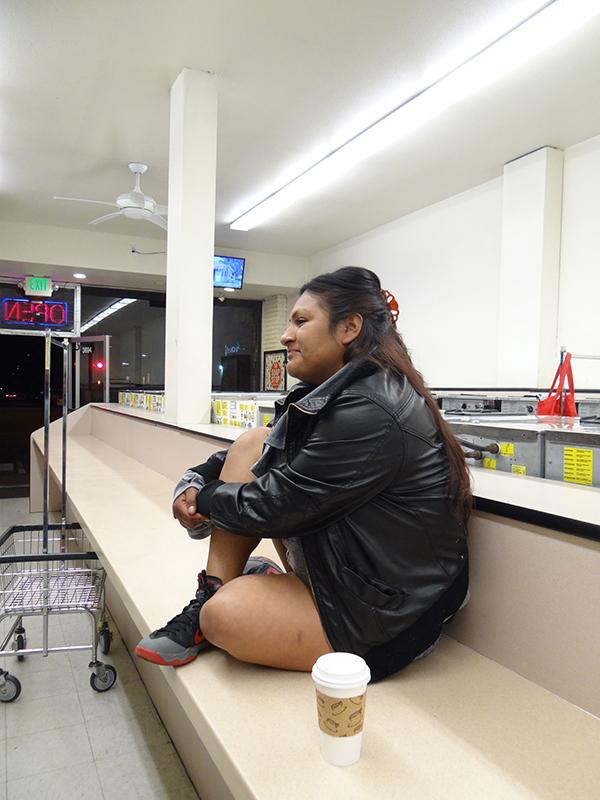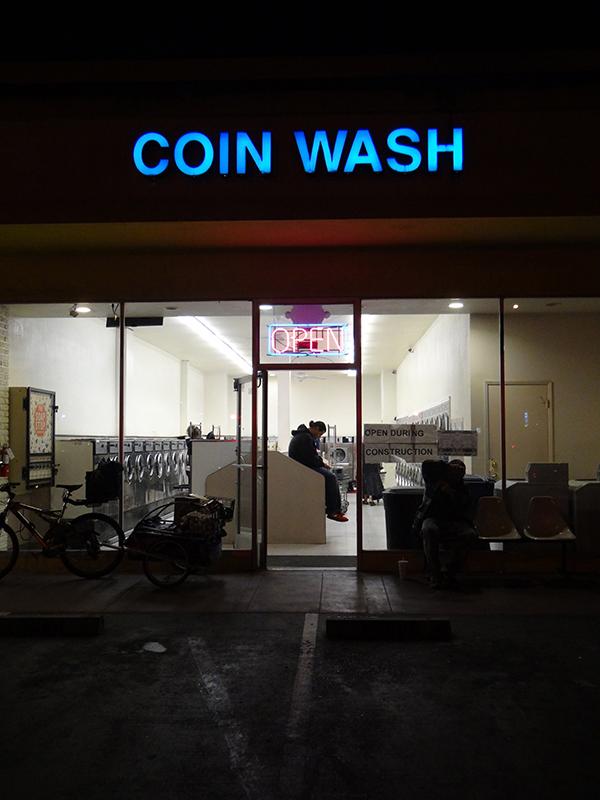With less than 20 minutes left before midnight, I scan the laundromat at 3894 El Camino Real and notice a glowing red handprint on the front window, as if someone had highfived the premises in the after-euphoria of clean laundry. As I walk closer to get a better look at it, I realize that the red hue is only a reflection of the glowing “OPEN” sign, and that the handprint is actually colored a filmy, ghost gray — like the residue of dried soap. At the time, all I saw was the red handprint, gleaming bright and steady despite the gray that lay underneath. But in reality, the handprint existed as a coalescence of multiple colors.
This moment, in my mind, stands as a reminder of the people I met that night: a unique mixture — much like the combination of the smell of fresh laundry and smoke — of an underlying feeling of hope despite a murky or difficult past.
At 10:30 p.m., I had left my house to go on an adventure — but the final destination was not a house party or a school roof. Instead, carrying a heavy basket of laundry, two grocery bags of snacks and a picnic mat, I headed out with three other staff writers to camp out at the local laundromat.
The location in question: Pacific Breeze Laundromat until its 2 a.m. closure, followed by Happy Donuts until we can no longer stay awake. The objective: Explore Palo Alto after dark and take a glimpse into the minds and lives of others who visit the premises during the witching hours.
We stepped through the glass door of the laundromat around 11:20 p.m., and soon realized that we were completely out of our league — like 10-year-old kids camping for the first time, we had a large stash of food and nourishments along with a dangerous case of the giggles. A few people milled about, without batting an eye at our misfit baggage, but we soon drew their glances as we spread out our picnic mat in the corner. In a last-ditch attempt to go incognito, I mirrored the other patrons and loaded billows of pink and green bed linens into one of the many washing machines lining the walls of the room.

The adventure was off to a slow start. The TV blared Honda Civic commercials while the washing and drying machines spun for an eternity, their whirring setting the monotonous tone of the midnight shift — anonymous passersby would come and go, quietly loading their laundry without exchanging a single word. At first, several of my attempts to approach fellow patrons were shut down, but eventually I met a confident, boisterous woman who was once in jail, a man who works more than 14 hours a day at Papa John’s and a homeless man who eloquently performed the words of an inspirational poem. The appearances of these people, much like the handprint, may fluctuate based on the moment — past, present or future — but what unites them is how their past experiences, present actions and future dreams converge into their own unique stories. What follows are the findings and experiences of a journey, undertaken by three other staff-writers and I, to get at least a glimpse into the lives of those who we might not have encountered otherwise.

The Past and Present
While I scan the room, searching for subjects to be interviewed, 26-year-old Reyna Chavez brings in the wafting smell of smoke as she plops down on a countertop, clad in a leather jacket and hair pulled back by a red barrett.
“It’s fun, huh?” Chavez asks. “A project snooping out at the laundromat? … But yeah, it’s just weird.”
When we take Chavez’s picture, her smile brightens, her eyes twinkle and her back straightens — according to her, it feels like she’s in Hollywood.
“My name is Reyna … in Spanish it means queen,” she says.
Arturo Wolf also thinks that it is late for teens to be out. I ask him where he works and he responds, “Come on, come on” and vigorously points at the red, white and green “Papa John’s” logo on his shirt.
The two of us concur that it’s hard to think at 1:42 a.m.
But despite the hour, people are willing to lend a few words to our eager ears. Chavez, who went to school in East Palo Alto, tells us about how she began to skip class in fifth grade and never graduated from middle school. Despite the fact that she went to Juvenile Hall and got kicked out of Woodside High School for beating up a girl, she appears approachable and confident, full of both hope and an awareness of the socioeconomic divide in our community.
When she was around 14, Chavez got a taste of the “life of a white, rich kid” — for a year and a half, she lived in a group home in Southern California and fell in love with the picturesque lifestyle there, in front of a backdrop of vast mountains and opulent houses.
“So there’s another life, you know, besides the life that goes on over there, on the other side of the freeway,” she says. “And I want it, you know? I want to try it out.”
Later, with a combination of apparent resignation and lack of surprise, Chavez mentions her plans to visit her friend tomorrow, whom she heard was shot in the head. I don’t know how to respond.
According to Chavez, Child Protective Services often take her friends’ kids away when their parents go to jail or commit crimes, like auto or identity theft.
But Chavez, who now lives in Redwood City, is currently working on getting her GED and turning her life around for her 6-year-old, “pure pure pink” daughter Eileen.
“She [my daughter] doesn’t know nothing else either but negative,” Chavez says. “She doesn’t like rap, she doesn’t like the hood … she wants to be away from it. [She] … wants the other life that we see on TV … you know?”
For her, the “other life” is the one portrayed in children’s TV shows “Even Stevens” and “Austin & Ally.” Although I do not possess an appreciation for the overly-boppy atmosphere of modern Disney Channel, I realize that its strange, color-saturated world isn’t as far-off of a portrayal of my life as it could be.

Also a witness of the unsaturated real world, Wolf, a driver for Papa John’s, observes the street every day. Wolf was raised in Mexico and moved to the United States 20 years ago, learning English through school. He plans to go back to Mexico, but for the moment remains in a daily routine in Silicon Valley. At the Papa John’s in San Jose, he starts work at 10 a.m. and gets off around 5 p.m., then heads to the Papa John’s next door to the laundromat to work from 5:15 until as late as 2 or 2:30 a.m.
“I like my job because I’m always out,” Wolf says. “I see people, I see money, I see many things. You know, if you are inside the store, nothing happens.”
As he speaks, he snaps a shirt out like the crack of a whip before beginning to fold it against his leg.
Looking Back and Moving Forward
Later, at Happy Donuts, we meet Kenny Bush, a 56-year-old man with a slow, earnest voice that possesses the consistency of molasses mixed with soft, rumbling gravel. The dim lights, aroma of hot oil and warm atmosphere of Happy Donuts seem to fade away into the night as I stand in front of him, captivated by his poetry:
For you are that one who comforts when doubt and fear comes near / For you are no disgrace to the human race / … You never question my fear, you have only been very dear / You are my night and shining stars — Bush looks at his hand and raises it up toward the ceiling in one fluid motion — that which brightens up the lights from dark morning nights.
Listen to poet and songwriter Kenny Bush, 56, recite the complete version of his poem. Bush believes in helping others form a foundation in their life, alluding to a person climbing a building amid the blowing wind. “The first blows might be devastating,” Bush says. “The second blow might be a little bit more, but less. The third might even come to the same trauma, but yet you got more sense to know how to deal with it. The fourth, pfft. Oh no, you can’t hit me like you used to. I don’t even feel it no more.”
According to Bush, his poems and songs are inspired by past experiences. He used to live in Solano County, but now, living in the heart of Silicon Valley, he finds many more opportunities to recuperate and get back on his feet.
“Being homeless out there, you have to find a way to escape from that county in Solano because the police’ll arrest you for sitting at the bus stop,” Bush says. “Out here, you can get on the 22 line and ride all night.” He chuckles. “And then nobody has to know your business. ”
Bush says that he grew up with a father who was sometimes overly demanding and aggressive, making it hard for him to maintain his self-esteem. He struggled to find the real Kenny Bush beneath a wave of derogatory names, but eventually gathered the guts to stand up to his father.
“That’s how I learned to have self respect, ‘cause I fought to get back my dignity,” Bush says. “He couldn’t take that from me.”
I rub my eyes, and Bush asks, “Are you crying?”, sending waves of hiccup-laughter through the room. I assure him that my eyes are just dry due to limited sleep, but his story does both sadden and inspire me — despite his past, Bush remains positive about the future. He believes that his father’s aggression stemmed from the “toxic waste” of his father’s own childhood, and through his words, he hopes to help others cope with the hardships in their own lives.
“I don’t take things — my past experiences, for granted,” Bush says. “Life is a journey. We have an opportunity to … help others have some insight on the positive things in life, or we could be destructive with it and bring them down, to where they have no foundation of any solid ground.”
Chavez, similarly, hopes to rebuild her life — she knows that, due to her past, “statistically” the odds are stacked against her. Despite this, she dreams of a future where she can give foster children a home — a big house like the one she lived in when she was 14 — where she can take care of them all.
“It’s hard out here. [I’m] a single parent, my kid doesn’t know her dad and I’m a criminal,” Chavez says. “[But] I’ve been trying to get my life back … I wanna bring them [kids] in, and I want to take care of them … There’s a lot of kids [whose] parents … don’t give them the acknowledgement and the security that kids need to hear, to feel capable of doing whatever they want to do, like having the courage to stay here all night. You know?”
We do not lose courage — hearing the stories of others invigorates us. However, eventually the inevitable desire for sleep takes over: At 3:22 a.m., we head home, and I mull over the lives, words and hopes we have gathered throughout the evening. Learning about the pasts of others, from Chavez’s childhood and Bush’s father, to glimpsing that present moment in which they are forever captured by my mind and paper, of Wolf whipping shirts with expert efficiency and Bush taking a sip of coffee — these images stay with me. And their futures, still unwritten and yet still tangible as dreams, remain as a source of inspiration and a means of seizing the past, no matter what the content, and using it to create what is to come.
We ride home, the air crisp and cool beneath the dark lavender-tinged sky, caught between the end of night and the beginning of day. Last words from Bush echo in my mind.
“So take what I said in your own life, because you’re not here for no reason at all,” Bush says. “[Of] my experiences I wouldn’t ever change nothing … your life is important, just like mine.”



